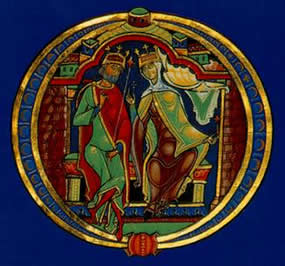The Song of Songs (1992)
For Soprano, Actor and Chamber Ensemble
Texts from a story by Sholom Aleichem (translated by Curt Leviant)
and the Bible
Duration: 32 minutes
Clarinet, Piano, Harp, Percussion, String Quartet
Commissioned by Harry L. Sebel, Jr. for Priscilla Sebel
Premiere Performance: March 1, 1992; Voices of Change
Irene Gubrud, Soprano; Fred Curchack, Narrator; RXR, Cond.
Recording: Robert Rodríguez; First Edition (FECD-0027)
Review:
‘Beautiful’ is not an adjective that ordinarily comes to mind when describing contemporary music. Beauty, however, is the primary characteristic of the Robert X. Rodríguez Song of Songs… Written as a Holocaust memorial, the work combines passages from the Biblical Song of Songs which is Solomon’s with a short love story by Sholom Aleichem… [The composer uses] the harp for its antique connotations, the cello to denote erotic feelings… and the clarinet for Klezmer-like passages… combined with ethereal accompaniments… as ravishing as the King James version’s poetry… While appealing musically, The Song of Songs somehow avoids both prettiness and anachronism. It is as delicate and fragile as a piece of crystal, but could have been written only in the 20th (or 21st) century…
Christopher Hyde, Portland Press Herald
…The highlight of the disc, for me, is a non-orchestral work, Rodríguez’s rapturous Song of Songs, which combines a setting of the Old Testament Song of Songs for soprano and chamber ensemble with a recitation of a short story by the great Yiddish writer Sholom Aleichem (1859-1916).
Frank Oteri, NewMusicBox.org
The Song of Songs, 12th-century Bible (Winchester Cathedral) 
Program Note:
The Song of Songs (Shir Hashirim) is a musical theater piece for soprano, actor and chamber ensemble. The music begins with the traditional Hebrew cantillation of The Song of Songs, with prominent use of the harp (the instrument of David). Thereafter, motifs from the ancient chant are woven into the musical texture along with a traditional Eastern European melody (Kol Dodi).
Rodríguez has interwoven two texts in The Song of Songs. The narrator tells a romantic story by Sholom Aleichem (1859-1916) about a young man who leaves home at an early age, returns for the marriage of his childhood sweetheart and discovers his love for her on the eve of her wedding.
The story is filled with poetic references to the Biblical Song of Songs, as the young man, in his reverie, recalls Solomon’s celebrated dialogue with his beloved Shulamite. The soprano, meanwhile, sings excerpts from the original Song of Songs in alternating lines with the speaker, portraying the man’s part as well as that of the woman in the Biblical drama.
